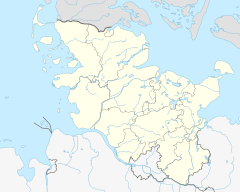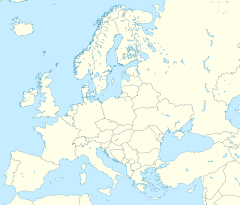Flensburg station
| Junction station | ||||||||||||||||||||||||||||||
 | ||||||||||||||||||||||||||||||
| General information | ||||||||||||||||||||||||||||||
| Location | Am Bundesbahnhof 5, Flensburg, Schleswig-Holstein Germany | |||||||||||||||||||||||||||||
| Coordinates | 54°46′28″N 9°26′12″E / 54.77444°N 9.43667°E | |||||||||||||||||||||||||||||
| Owned by | Deutsche Bahn | |||||||||||||||||||||||||||||
| Operated by | DB Station&Service | |||||||||||||||||||||||||||||
| Line(s) |
| |||||||||||||||||||||||||||||
| Platforms | 4 | |||||||||||||||||||||||||||||
| Other information | ||||||||||||||||||||||||||||||
| Station code | 1810[1] | |||||||||||||||||||||||||||||
| DS100 code | AF[2] | |||||||||||||||||||||||||||||
| IBNR | 8000103 | |||||||||||||||||||||||||||||
| Category | 3[1] | |||||||||||||||||||||||||||||
| Website | www.bahnhof.de | |||||||||||||||||||||||||||||
| History | ||||||||||||||||||||||||||||||
| Opened | 1 February 1927 | |||||||||||||||||||||||||||||
| Services | ||||||||||||||||||||||||||||||
| ||||||||||||||||||||||||||||||
 | ||||||||||||||||||||||||||||||
| ||||||||||||||||||||||||||||||
Flensburg station (German: Bahnhof Flensburg; Danish: Flensborg Banegård) is the main station of the town of Flensburg in the German state of Schleswig-Holstein. The station is located some distance from the city centre in the Südstadt district in southern Flensburg, just south of the Innenstadt district.
Flensburg station is an important junction station, and lines run from it to Kiel, to Hamburg via Schleswig and Neumünster and to Fredericia in Denmark. The station also handles cross-border rail traffic between Germany and Denmark.
The first station in Flensburg opened in 1854 and was located in the city centre. It was moved to its current location in 1927. Between December 2007 and December 2015, Flensburg was connected to Deutsche Bahn's Intercity Express network.
History
[edit]
On 1 April 1854 the Flensburg–Tönning line was opened by the British entrepreneur, Sir Samuel Morton Peto to a station outside the city at Holzkrug. On 4 October, its station in the city was opened, which became known as the English Station (Englischer Bahnhof). This station was at the south end of Flensburg Fjord in the Flensburg old town and was formally handed over for operations on 25 October by the Danish king, Frederik VII.
Ten years later, in 1864, the line was extended to Vojens in North Schleswig (now in Denmark) and soon after to Fredericia. In 1869, the current, shorter route to Hamburg via Schleswig and Rendsburg was put into operation.
In 1883 the original, simple station building was replaced by a more complex design of Johannes Otzen, a famous church architect. The original station was subsequently converted into Germany's first bus station. On 1 February 1927, the present station was inaugurated outside Flensburg’s old town, on the North Schleswig Loop, which avoids the old Flensburg terminal station. Trains to and from Denmark run over a loop, which is several kilometres long, to reach the station. The station in the town built in 1883 became a freight yard and was later closed.
Passenger services were closed on the line to Husum via Löwenstedt in 1959. In 1981, the last service ran on the line to Niebüll.
Operations
[edit]Station facilities
[edit]The Flensburg station is a particularly impressive collection of brick expressionism of the 1920s and some of its outbuildings are partially protected as monuments.
Routes
[edit]- Neumünster–Flensburg railway
- Kiel–Flensburg railway
- Flensburg–Fredericia railway
- Flensburg–Niebüll railway (until 1981)
- Flensburg–Husum railway (until 1959)
- Flensburg Port Railway (only freight)
Tracks
[edit]The station has several tracks, but only four of them have access to a platform. The tracks were electrified in 1996 and the track were renumbered, with track 5 near the reception building and track 1, furthest away from the main station building, unusually in Germany.
In normal usage platforms are used as follows:
- platform track 5: regional trains to and from Neumünster
- platform track 4: regional trains to and from Kiel
- platform track 2: long distance and regional trains to and from Neumünster/Hamburg as well as to Denmark
- platform track 1: long distance and regional trains to and from Neumünster/Hamburg as well as to Denmark
Rail services
[edit]
In long-distance transport, a Eurocity service runs from Aarhus to Hamburg via Flensburg. These operate as Intercity services in Germany.
DB Regio Nord operates Regional-Express and Regionalbahn services between Neumünster and Hamburg every hour.
The Flensburg–Kiel route is currently also operated by DB Regio Nord every hour (as of 2024).
| Line | Route | Frequency |
|---|---|---|
| EC 27 | Flensburg – Schleswig – Hamburg – Berlin-Spandau – Dresden – Prague | 1 train pair |
| IC 76 | Flensburg – Padborg – Fredericia | Every 2 hours |
| RE 7 | Flensburg – Hamburg | Hourly |
| RE 72 | Flensburg – Eckernförde – Kiel | Hourly |
See also
[edit]Notes
[edit]- ^ a b "Stationspreisliste 2025" [Station price list 2025] (PDF) (in German). DB Station&Service. 28 November 2024. Retrieved 5 December 2024.
- ^ Eisenbahnatlas Deutschland (German railway atlas) (2009/2010 ed.). Schweers + Wall. 2009. ISBN 978-3-89494-139-0.
References
[edit]- Detlefsen, Gert Uwe (1984). Flensburg in alten Ansichten (in German). Zaltbommel. ISBN 90-288-2718-8.
{{cite book}}: CS1 maint: location missing publisher (link) - Pust, Dieter (2002). Flensburg – Eine Stadt und ihre Geschichte (in German). Germering. ISBN 3-87890-093-7.
{{cite book}}: CS1 maint: location missing publisher (link) - Kaufhold, Holger; Klein, Eckhard; Schikorr, Detlef (2004). 150 Jahre Eisenbahn in Flensburg - Von der südschleswigschen Eisenbahn zur Deutschen Bahn AG (in German). Vol. 58 LOK Report. Sigmaringen: Ges. für Flensburger Stadtgeschichte. ISBN 3-935909-22-5.
External links
[edit]- "Track plan" (PDF, 180 kB) (in German). DB Netz AG. Retrieved 21 November 2010.
- "Track plan in 1938" (in German). Retrieved 21 November 2010.
- "Flensburg station" (in German). Stationsbüro SH. Retrieved 21 November 2010.



